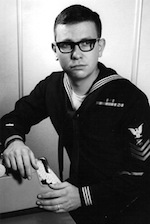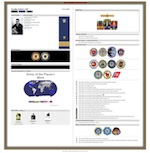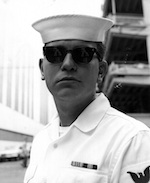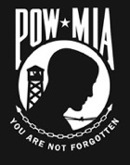 |
- OTHER SERVICES VOICES:
- MARINES
- •
- NAVY
- •
- AIR FORCE
- •
- ARMY
- •
- COAST GUARD
|
An up close and personal interview with Coast Guard Veteran and TWS Member:
Commander (USCG Ret) Robert Douville (USCG 1961-1997)
WHAT PERSUADED YOU TO JOIN THE COAST GUARD?
Unemployment, the probability of being drafted into the Army, utterly ignorant assumptions about how "easy" Coast Guard boot camp would be and, being very naïve and completely scammed by the recruiters. In January 1961 I was home again a year and a few months out of high school, having been unsuccessful in my initial effort to spread my tiny wings and fly out of the nest. I knew my local draft board would soon send me greetings. I also had learned from the local group commander; a hard old Commander, combat veteran of WWII North Atlantic convoys, that the CG was a part of the Armed Forces. He looked like I had slapped his face when I asked him if the Coast Guard fulfilled the military obligation. But he controlled himself and said through a clenched jaw, "It certainly does, son. It certainly does." I saw a brief classified ad saying a CG recruiter would be in town so when he came I went to see him. "Did the CG have Journalists?" Flip, flip, and flip through the rate brochure. "Sure, see here?" I thought I had made no commitment but the Chief OIC of the RO in Green Bay called in early January; he put on a great show of being very upset because I had not presented myself at his office earlier that day. In retrospect I am certain it was all an act to stampede a gullible kid into their quota. They knew a fish when they saw one. I thought I had done something wrong so the next thing you know I found myself in Forming Company at the RTC in Alameda. There I was shocked, having quickly learned just how wrong my assumptions were about Coast Guard boot camp being soft and easy. At graduation I was three inches slimmer in the waist and five pounds heavier.
BRIEFLY, WHAT WAS YOUR CAREER PATH?
The first thing to know about my career path is that it is not an example that anyone should or would want to follow. The classification yeoman just laughed when I said I wanted to be a journalist. So out of boot camp, after a few months as a recruit personnel yeoman, I went to YN school then at the CG Training Center in Groton, Connecticut; then reported to the CG Air Detachment at Kodiak, Alaska. When I left Kodiak I asked for JO School but was assigned to Group Duluth, Minnesota. But six months later, while serving at Bayfield (Wisconsin) Moorings, I did get orders out of the blue to Navy JO "A" school at NTC Great Lakes, Illinois. My first JO assignment was back at the RTC in Alameda. I had too much ego and not nearly enough good judgment; a combination that, with alcohol added, could lead only to a bad outcome. I screwed up and after 54 days at the Marine Brig on Treasure Island (SF Bay) the Coast Guard hustled me out of California, but only after I sewed Seaman's stripes where the outline of the second class crow I lost still showed on the sleeve of my jumper. I had come close to it but avoided a Bad Conduct Discharge. The Coast Guard then hid me at Fleet Home Town News Center, again at NTC Great Lakes. When the CG was tapped by the Navy in 1965 to send a squadron of point class patrol boats to South Vietnam I volunteered. My first significant mentor was then CWO Gil Shaw (later retired as LCDR). Gil had a lot of stroke in the Coast Guard (not uncommon for some warrant officers) so in May 1965 I was back at Alameda as a plank holder in Coast Guard Squadron One. By then I had made E4 again.
After Vietnam (see below) I went to the Eighth District office in New Orleans. (I met a young woman who worked in the same building - Joan and I are now in our 44th year together.) The District Commander had charge of all CG ops from the Texas-Mexico border to the Florida panhandle in the Gulf of Mexico. When I was E6 in 1967 I went to the DOD advanced information school at Fort Ben Harrison, Indiana. I won an "outstanding speaker" contest; not as much on delivery or eloquence but out of sheer audience fascination with my topic. I talked about my experiences in the brig at Treasure Island. When I returned, RADM Ross P. Bullard was the new District Commander. He called me into his office and showed me an "atta boy" letter that he got from the DOD School Commandant at Fort Ben Harrison. That letter led to a two year stint of writing speeches for Bullard including helping him with remarks he made to the families of the crew of the White Alder, tragically lost in the Mississippi River in 1968. My work as speechwriter would greatly benefit me. I made Chief (E7) in 1969 and received a transfer to the Coast Guard Academy public information staff. Soon after I reported for that assignment there was a service-wide exam for promotion to warrant. I needed a recommendation evaluation prepared to go with my application package. My boss and the Academy personnel officer decided to send it back to the Eighth District as I was not then known to them. It came back filled out by Bullard in his own hand. A little over a year later I made warrant.
In 1976, with more than five years as a warrant, I finally convinced the CG (after three earlier tries) to forget about the skeleton that kept falling out the closet; on my fourth application I received orders to Yorktown for what was called Officer Indoctrination. I know I was helped along by RADM Sydney Wallace who was chief of public and international affairs at HQ in 1976. He called on me to ghost a lead piece for the Commandant, ADM Owen Siler, to appear in an all CG edition of Naval Institute Proceedings. (ADM Siler was the last of a triumvirate of aviators, along with Willard Smith and Chester Bender, who ran the Coast Guard for 12 years beginning in the latter half of the Sixties. Wallace was also an aviator and attorney, while the chief of personnel procurement, including OCS selection, was an aviator Captain who was Wallace's Academy classmate.) In December 1976 I received a temporary commission as O2 LTJG and in 1979 I was promoted to permanent Lieutenant (O3). I had five assignments living in the same house outside New Orleans, including the old Group/Base/COTP, the old MIO; Offshore Industry Training; Marine Inspection Detachment Houma, Louisiana, where I was in charge from 1986-87, and MSO New Orleans as chief of investigations. In 1991 I was selected for O5 and finished out my career with a penultimate tour at the National Pollution Funds Center and finally as an Atlantic Area Civil Penalty Hearing Officer in New Orleans, retiring in 1997 with 36.5 years continuous active duty.
DID YOU PARTICIPATE IN COMBAT OPERATIONS?
I was never in combat to qualify for the combat operations ribbon but one of my most interesting experiences was a three day stint with a Special Forces A Team on Phu Quoc Island, near the Cambodian border in the Gulf of Thailand. I was also a supernumerary on the Cutter Point Grey during the Hon Mot raid on the north end of Phu Quoc in September 1965. With another patrol boat we put ashore a group of Special Forces led Civilian Irregular Defense Group troops and stood by offshore to provide gunfire support. Several hours after landing the raiders made contact and came under heavy fire. SSgt. James Pruitt was KIA. Our boats provided mortar fire support and the VC broke contact. It was a painful day. None of us in the Coast Guard had been exposed to the grim reality of combat. We were shocked and terribly saddened by the loss of the Sergeant. A couple of very brave crewmen went ashore in a small boat while the firefight continued to bring Pruitt out along with a wounded CIDG trooper. Later in my tour the Squadron commander and staff, that included me, moved to Naval Advisory Group HQ (this was before Naval Forces Vietnam) in Saigon. While in Saigon another Division of Squadron One patrol boats arrived to be based at Cat Lo. I had an opportunity to make an interdiction patrol for a couple of days in the Rung Sat Special Zone. We took a couple of rounds but there was no combat. We did almost engage a SEAL team not known (to us anyway) to be operating in the area. Later we picked up a Marine ambush squad that had spent the night in the swamp. They ate everything they could get their hands on and we gladly gave it to them.
But the closest I came to being killed or wounded was an irony. The Buddhists were demonstrating in Saigon and had us all on edge. Although garrison troops were not supposed to carry weapons many packed side arms under shirts or in satchels. Like many other GI's I'd had a tailor made pair of black pajamas made by one of the many Indian tailors in the city. I was in my billet wearing my black PJs knocking back a cold one when the staff storekeeper, well "fortified" from a trip to our billet from the office lurched unsteadily into the open doorway. In his hand was his .45 automatic pointed directly at me. "Get out of them VC clothes," he slurred. Needless to say I complied. Later we were able to disarm him, determining that the piece was loaded with one in the chamber and the safety off before the MPs came and took him away. I don't think he remembered any of it.
FROM YOUR ENTIRE SERVICE CAREER WHAT PARTICULAR MEMORY STANDS OUT?
When I graduated from Officer Indoctrination my defense counsel (from my earlier days), who had a career as a deck officer and including several commands at sea, called to congratulate me. At the time he commanded a medium endurance cutter in Florida. He told me that when he held Captain's Mast he often used my story in counseling his wayward sailors; attempting to encourage them and help them understand that because they had gotten into trouble did not mean they could not redeem themselves and go on to have a constructive and rewarding Coast Guard career. I was extremely moved and very grateful that he shared that with me. When I retired he came to my retirement ceremony. That was better than a medal although there is one in particular that is dearest to me; the CG Good Conduct Medal. It was the hardest one for me to earn; took nearly eight years when in my day it normally took four. It is the enlisted man's badge. No matter what you do later in your career that Good Conduct ribbon says this person served honorably in the enlisted ranks; it says this officer is a "mustang" and that is very special to me. One day the Academy grads will lose their iron grip on the office and a mustang will be Commandant. I hope to live to see that.
WHICH INDIVIDUAL PERSON FROM YOUR SERVICE STANDS OUT AS THE ONE WHO HAD THE BIGGEST IMPACT ON YOU...AND WHY?
That is tough one to answer. I've mentioned several above and in addition I should mention the late Captain Richard M. McCool, USN, for whom I worked as a warrant officer and CG representative at Fleet Home Town News Service. When I reported for duty Captain McCool was wearing his service dress blues. Sitting alone atop his multiple rows of ribbons there was a blue one with white stars. It was my privilege and good fortune to work for a warrior and a hero. Despite his pain from his war injuries and his personal problems he was one the finest officers I met in my career.
But in the end I have to say Ross Bullard was the officer who had the most impact on me personally and professionally. He was more than my boss, he was counselor and mentor and a singular example of what it takes to be an officer of high honor and achievement.
WHAT PROFESSION DID YOU FOLLOW AFTER THE SERVICE AND WHAT ARE YOU DOING NOW?
I am now semi-retired from working as a Marine Regulatory consultant in the private sector.
HOW HAS SERVING IN THE COAST GUARD INFLUENCED THE WAY YOU NOW APPROACH YOUR LIFE AND CAREER?
Wow! My wife and our two sons would probably say, "You've got to be kidding! How has it not influenced his life and career?" Since I really came of age in the CG (19 years old and not very mature when I joined) it's hard for me to separate out those influences that are not in some way traceable to my Coast Guard experience. I guess the reality that the source of almost all of an individual's problems may be found by looking in a mirror is one truth I've learned from my time in the CG. I also know that respect goes in two directions; up and down the chain-of-command; one will fail as a leader if he does not earn the respect of and give respect to those under his leadership. And in a high public contact role, as are those in the commercial marine safety field, regulators and enforcement officials must show respect to those whose lives and businesses they affect. Sometimes my colleagues in the past and even today need to remind themselves of that.
HOW HAS TOGETHERWESERVED.COM HELPED YOU TO MAINTAIN A BOND WITH THE SERVICE AND THOSE YOU SERVED WITH?
I've had several personally rewarding experiences since joining CGTWS. I found my brother's page; he's a retired Navy Chief. I reestablished contact with Gil Shaw and I found a page for a retired LCDR with whom I served from 1977-79. I also found a memorial page for the late CWO4 Bob Melia, established by one of the many friends he made during his remarkable and unique CG career. His widow, Karen, is a member of our local MOAA Chapter. I'm going to work with her to complete Bob's TWS page. I've found CGTWS to be a great experience. |

Commander (USCG Ret) Robert Douville

View Commander (USCG Ret) Robert Douville's Shadowbox on TWS

Public Information Office
|
|
Share this Voices Edition on:



 |
|
TWS VOICES
TWS Voices are the personal stories of men and women who served in the US Military and convey how serving their Country has made a positive impact on their lives. If you would like to participate in a future edition of Voices, or know someone who might be interested, please contact Major Wesley Prater HERE.
View the Complete Togetherweserved Voices Archive HERE
This edition of CoastGuard Voices was supported by:
COASTGUARD.TOGETHERWESERVED.COM
For current and former serving Members of the US Coast Guard and US Coast Guard Reserve, TogetherWeServed is a unique, feature-rich resource enabling Coast Guardsmen to re-connect with lost Shipmates, share memories and tell their Coast Guard story.
Click HERE if you need a password reminder for http://CoastGuard.togetherweserved.com.
|
|